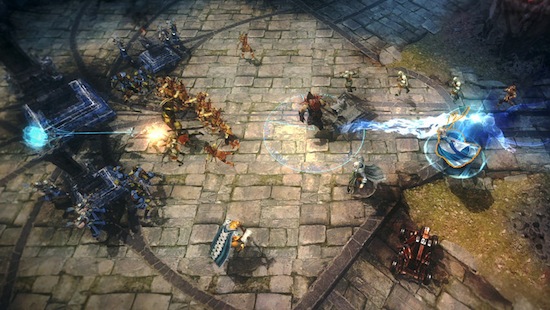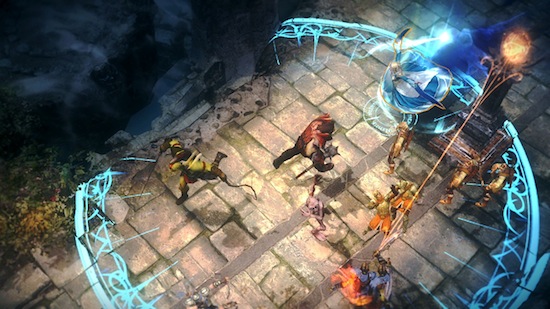Guardians of Middle Earth, XBLA – Guest Reviewer
Who better to review GoME than somebody that grew up with NZ’s Hobbiton in his backyard? Chris Leggett gets stuck in.
 Some genres reside almost exclusively on PC largely for control-scheme reasons. The real-time strategy (RTS), for instance, rarely strays from the realm of the mouse and keyboard. While Halo Wars made an admirable attempt to do for console RTS what Halo: Combat Evolved did for first-person shooters, it just didn’t quite get there.
Some genres reside almost exclusively on PC largely for control-scheme reasons. The real-time strategy (RTS), for instance, rarely strays from the realm of the mouse and keyboard. While Halo Wars made an admirable attempt to do for console RTS what Halo: Combat Evolved did for first-person shooters, it just didn’t quite get there.
But what of the multiplayer online battle arena (MOBA) – a genre born from player-created mods of real-time strategy games? Ironically, it turns out that, despite the failings in the translation of RTS to the humble console, this sub-genre seems to make the transition fairly well.Of course, I make this comment as someone who can’t really comment. You see, I’m not a PC gamer at all, and I’d most certainly never played a MOBA until a fine gentleman sent me a code for Lord of the Rings: Guardians of Middle-earth. It’s, as far as I’m aware, the first traditional MOBA ever attempted for the home console (not counting the 2D, side-scrolling take on the genre, Awesomenauts). And owing to the fact that it’s got me hooked on a style of game that I was previously quite daunted by, I can only assume that Monolith Studios has done a fine job. Worst case, it’s an interesting and truly addictive game in its own right that brings something quite different to the rather limited variety of multiplayer experiences on Xbox Live Arcade. MOBA is the name that gamers have applied to popular PC games Defense of the Ancients (DotA) and League of Legends (LoL), which (as aforementioned) began as modified gametypes for Starcraft and Warcraft III respectively. It’s a team-based multiplayer style of game, where each player controls a single unit – in this case, powerful characters from Lord of the Rings lore, known here as “Guardians”. In teams of five per side, the objective is to destroy enemy defensive structures on a symmetrical map (comprised of up to three “lanes,” where the combat takes place), culminating in the destruction of the enemy’s main base on the opposite end of the playing field. AI-controlled units assist players in doing so, and coordinating with these while repelling those of your enemy is vital to success.
MOBA is the name that gamers have applied to popular PC games Defense of the Ancients (DotA) and League of Legends (LoL), which (as aforementioned) began as modified gametypes for Starcraft and Warcraft III respectively. It’s a team-based multiplayer style of game, where each player controls a single unit – in this case, powerful characters from Lord of the Rings lore, known here as “Guardians”. In teams of five per side, the objective is to destroy enemy defensive structures on a symmetrical map (comprised of up to three “lanes,” where the combat takes place), culminating in the destruction of the enemy’s main base on the opposite end of the playing field. AI-controlled units assist players in doing so, and coordinating with these while repelling those of your enemy is vital to success.
One thing players will require in order to play Guardians of Middle-earth is patience; not just because the style of gameplay demands it, but also because the wait times to find a match are a little on the long side. Don’t be surprised to wait in the region of eight minutes to join a game. Whether that’s owing to the size of the community at launch or to the long-match, player-hungry nature of MOBAs is unknown. Hopefully it’s the latter. However, I do suspect that Guardians of Middle-earth will enjoy an enduring, cult community well beyond that of a typical XBLA multiplayer game. Occasionally, a roughly 10-minute wait to join a match was frustratingly followed by a prompt disconnect, which was then followed by another 10-minute wait. However, this happened infrequently enough to be forgivable.
In game, death comes swiftly, and so players must engage conservatively with other Guardians. Especially in the early stages, team-up attacks and hit-and-run tactics are encouraged. Scoring kills against enemy Guardians typically relies on opportunity and allowing the enemy to become suitably weakened before engaging. There are layers of complexity to MOBA combat, and it takes a lot of experimentation and experience to unravel all of the subtleties.
Each player levels up throughout the course of a match, and the key is to level up as quickly as possible so as to gain an edge over your opponents. Each Guardian begins a match with three special abilities (with a fourth unlockable once a certain level has been attained), and players must endure a cool-down period before each ability can be reused. As players level, they can also upgrade the many defence towers scattered throughout the map, which determines the strength of their defensive capabilities and the strength/nature of friendly AI teammates.
Players earn coins as over time, which can be used to purchase locked characters, and also to purchase gems and relics to augment their abilities (in a system not unlike Final Fantasy VII’s “materia” mechanic). These gems and relics provide certain buffs, such as increasing a player’s overall health, damage and healing rate. Different combinations of these gems and relics can even be saved as loadouts for convenient selection before a match.
 Impressively, Guardians of Middle-earth controls very intuitively, owing to a clever combination of traditional, action-RPG controls and a radial-targeting mechanic. Players are left under no illusions as to where their attacks will land, making it relatively easy for newcomers to dive into an otherwise complex game type.
Impressively, Guardians of Middle-earth controls very intuitively, owing to a clever combination of traditional, action-RPG controls and a radial-targeting mechanic. Players are left under no illusions as to where their attacks will land, making it relatively easy for newcomers to dive into an otherwise complex game type.
The Lord of the Rings license lends itself very well to this type of game, and it’s fun to see the familiar range of characters and creatures engaged in full-on warfare. There’s no real sub-plot or pretext to the battles of Guardians of Middle-earth, and you’ll frequently see teams of unlikely allies; Sauron and Gandalf can fight on the same team, for instance. There are 20 Guardians in total, with many of them among the more obscure characters of Tolkien’s universe (such as the dwarf Ori and goblin sorcerer Lugbol).
Aside from the option to play a match with remaining friendly and enemy player slots filled with AI Guardians, there’s no single-player feature to Guardians of Middle-earth. And it’s an understandable move, to be honest; there’s not really the scope within this style of game for a story-driven component, and so Monolith has wisely focused on the multiplayer aspect alone.
 Whether MOBA purists are impressed is another matter, but the fact remains that Monolith has crafted an enjoyable console take on an otherwise exclusive genre in Guardians of Middle-earth. There’s a surprising amount of depth on offer here in a package that seems rather shallow on the surface. Those with little patience might be put off early, but those who persevere through its punishing initial difficulty curve will find a rewarding experience.
Whether MOBA purists are impressed is another matter, but the fact remains that Monolith has crafted an enjoyable console take on an otherwise exclusive genre in Guardians of Middle-earth. There’s a surprising amount of depth on offer here in a package that seems rather shallow on the surface. Those with little patience might be put off early, but those who persevere through its punishing initial difficulty curve will find a rewarding experience.



